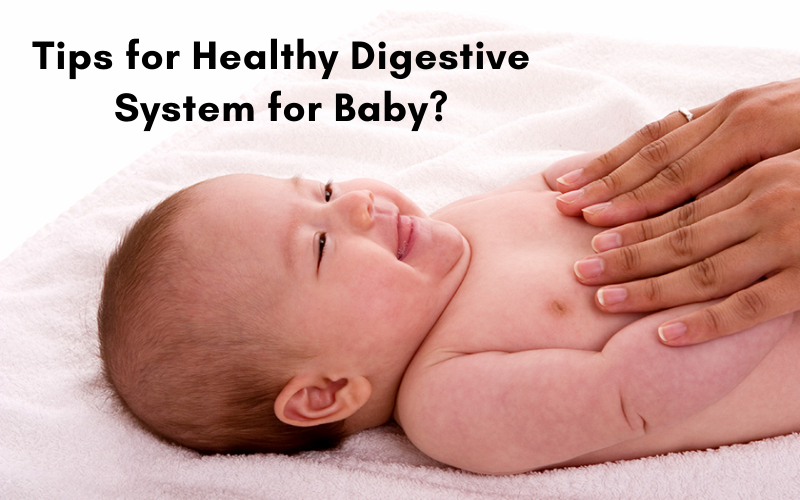How to Improve Your Baby’s Digestion?
Babies! They’re cute, tiny, cuddly, and little bundles of joy, who most of us like (at least when they’re not crying or pooping). They may be incredibly cute and fun to play with but they’re that much more difficult to look after. Their inability to voice their discomfort and the cause of it can be deeply stressful for the parents and anyone else who looks after them.
Observing a baby being uncomfortable, in pain, and not being able to do much about it is not only heart breaking but also a trigger for most adults and may make them feel as though they’re not competent parents. Common issues like indigestion (which is what you’ll read up on today) are a routine part of having children and being new parents or caretakers.

This blog houses everything in, about, and around indigestion to help simplify the task of comforting your baby without panicking. So, if you’re a new parent, a soon-to-be parent, know someone who is expecting, training to be a professional nanny, preparing to help out friends and family with their babies, want to prepare yourself for the future, or just simply want to learn and expand your knowledge, keep on reading!
What is Indigestion?
Commonly referred to as “upset stomach” or known as “dyspepsia” in scientific circles, indigestion is a very common phenomenon experienced by infants, toddlers, adults, and the elderly alike. For babies specifically, the result of indigestion is called ‘acid reflux’ or ‘infant reflux’ wherein they spit out or vomit small amounts of some of the food they’ve eaten (in liquid form) and refers to pain in the upper abdomen and the general discomfort around the stomach area after mealtime in babies. Vomiting a few times a day is usually normal and not a cause for concern. However, prolonged vomiting results in the baby emptying out the entirety of their meal and thus becomes the problem of acid reflux. Vomiting of food on a frequent basis may be common as reflux occurs in babies multiple times a day but it should last no longer than 18 months. The feeling of indigestion is rather similar to heartburn, so much so that the terms are often used interchangeably. Infant reflux, being a direct result of indigestion, can be prevented using a few simple measures.
What Causes Acid Reflux?
Infant reflux, which by now you’re aware can be a result of indigestion, happens for the following reasons:
- An underdeveloped lower esophageal sphincter (LES): This is a crucial part of the human body. It is a ring-like muscle that rests at the end of the esophagus, right where it joins the stomach. This ring only opens up when eating or drinking and stays closed the rest of the time, unless a person may be puking. When the LES remains underdeveloped, infant reflux happens.
- When they lay flat most of the time: As young babies, a lot of moving about obviously is not required. However, it is advised that young babies who may be spitting up food and crying because of bloating or gas, should be made to lay on their sides and tummies when they’re old enough to be able to balance their weight and can be made to sit with the help of a few pillows.

- Consuming an almost completely liquid diet: Once your baby is 6 months of age, it is important to slowly start incorporating some solid food and build up their capacity to food and improve digestion in the process. It is understood that a more solid diet will have a difficult time traveling back up the esophagus.
- Being born prematurely: When babies are born premature, quite a few of their organs and body parts have often not developed to their fullest. And sometimes, being outside the environment of their mother’s womb, it becomes difficult for them to develop further. Hence, underdeveloped infants may lack proper functioning in their digestive system, ultimately leading to reflux.
What Causes Indigestion?
Indigestion can occur in babies for a variety of reasons. Here are a few:
- The delicateness and immaturity of the digestive system in infants. At an age when babies are that fragile, the internal organs which are only just starting to work properly can be easily irritated both from internal and external factors.
- Insufficient sleep. Sleep is a big stressor even for adults, and infants need it a lot more than we do. Irregularities in the said sleep and its routine can cause discomfort and ultimately, prolonged indigestion in babies.
- Being overweight. With such little bodies, having all that extra weight can cause a lot of discomforts and affect the digestive processes.
- Eating or drinking too much/ too fast. Since the digestive systems aren’t in full bloom, introducing food to your baby’s stomach too fast or in large quantities can be both dangerous and a cause for indigestion.

- Exposure to second-hand smoke. Smoking (cigarettes) or being exposed to a lot of smoke (mostly industrial areas) is harmful and dangerous for adults as it is, but can be seriously detrimental to the overall health of an infant. If you’re looking after a baby, please ensure that no one around them is smoking and avoid taking them out at times when the air is extremely Smokey.
- Lactose intolerance, gluten-resistance and other allergies. It can happen that babies are born with certain allergies and may be intolerant to certain types or groups of food (without a familial history). These foods may be a very common part of your dietary routine and culture but can be detrimental to the health and well-being of said baby. In extreme cases, intolerance towards dairy products and allergies to nuts and gluten can cause permanent damage to the digestive system (thus, resulting in indigestion) and may even be fatal at times.
Sign and Symptoms
Figuring out what is troubling your baby can be a daunting task that may make you feel overwhelmed. However, indigestion as a problem has some tell-tale symptoms that you can watch out for. These may include:
- Backache during mealtime: Of course, your baby can’t tell you where it specifically hurts. But, if your baby seems uncomfortable and in pain, try to put a little pressure in the middle portion of his back, if he starts to cry, there goes your answer!
- Refusal to drink milk: Babies need nutrition and it is rare for them to avoid mealtime for prolonged periods. If your baby refuses to latch for more than 4 hours, it is a cause of concern.
- Frequent hiccups: Hiccups are an annoying symptom of indigestion and can be deeply uncomfortable for a baby to experience. If common methods of relieving these don’t work, you may want to figure out if indigestion is the cause behind it.
- Breathing difficulties: They can be troubling to observe in your baby and can be that much more bothersome to the child himself. Difficulty in breathing is a dead giveaway that your baby may be experiencing a serious problem that requires immediate medical attention.

- Prolonged congestion: It may not be evident but congestion and indigestion have more in common than you may think. A quick conversation with your pediatrician can help clear any confusion or doubts you may have and ultimately, may prove to be beneficial for your child.
- Nausea and Vomiting: Alongside everything else, these two symptoms are probably the most common of all. They’re experienced by people of all age groups but since there’s not much else that leads to vomiting in infants, it is safe to assume that the reason behind these bursts of nausea is nothing but indigestion.
- Bloating: This symptom may be very easily observable, especially since young babies have expressive tummies and even more expressive cries. Bloating is rather common for a baby, especially right after being fed a food item that is foreign to them, for e.g., the first time you may mash a banana for your baby’s meal.
When to Visit a Doctor?
While indigestion in babies is a fairly common problem and more often than not, doesn’t require medical attention, but the following situations may need you to pay your pediatrician a visit:
- When your baby is anemic or has an iron deficiency. Indigestion can mess up your baby’s systems in a lot of ways if left ignored for a long time. Anemia or iron deficiency is serious, especially infants. A clear indication of the possibility of anemia includes pale gums, tongue and cheeks with no pinkish flush (which is rare for babies).
- When your baby vomits after every meal. A few spit-ups here and there are normal, as discussed before but that much puking is a clear indicator that you need to visit a doctor and figure out the root cause of the problem.
- When your baby is swallowing food with difficulty. Since babies mostly eat mushy and liquid foods, difficulty in swallowing their meals should not be a problem at all. If it poses to be one, visit the doctor asap.
- Where your baby vomits or poops blood. Human blood only belongs inside the veins and arteries and nowhere else. It is a great cause for concern even in adults. So, if you’ve observed blood in your baby’s vomit or stool after prolonged indigestion, run to the doctor now!
- When your baby sweats a lot more than usual. Sweating is obviously a normal phenomenon, especially with all those layers that we like to put our babies in because what could be worse than a cold for a baby? Heartburn, indigestion, heatstroke and so much more! Talk to a doctor to ascertain the cause of untimely and unnecessary sweating.
- When your baby has loose motions and loses a lot of weight. Losing weight in babies is always a sign of declining health. At that age, babies need to only gain more weight. If this weight loss is paired with frequent loose motions, they become clear indicators of dangerous indigestion. Talking to your doctor and making a plan to improve diet and implement weight gain can help a great deal in making your baby feel comfortable.
Natural Ways of Improving Digestion in Babies
If the problem of indigestion hasn’t yet gotten out of hand and you can probably do a few things about it, here are a few simple ways to try and improve your baby’s digestive processes from the comfort of your home:
- Feed them breastmilk: Formula feeding isn’t a concept in most Indian households and that’s the way it should be. A mother’s breast milk has all the essential nutrients that are required by a baby below the age of 6 months (for that duration, you should only breastfeed your baby). Most Indian mothers continue to breastfeed alongside other foods even after 6 months. Breast Milk has a lot of essential nutrients that boost the development of the digestive system and other important functionalities of a baby’s body.

- Hold them upright more often: As we mentioned before, laying down at all times can do more harm than good. Standing or sitting upright is better for indigestion and has something to do with gravity receding your body (or in this case, your baby’s body), thus helping indigestion.
- Burp them after meals: Always burp your baby. Because their digestive systems aren’t as advanced as ours yet, physically burping them becomes essential. The movement when you sway them slightly in your arms or have them bounce a bit can help a great deal.
- Give them baby massages: Outside friction can apply small amounts of pressure on the stomach, thereby increasing the rate at which gastrointestinal organs normally function and facilitating indigestion.
Ways to Prevent Babies from Having Digestion Problems
Prevention certainly is better than cure. Why look for ways to treat indigestion when you can simply prevent it using a few of these measures:
- Feed you baby small meals at regular intervals: Large meals only a few times a day can be a lot for their poor small baby stomachs to process and handle. You’ve already read how fragile and underdeveloped their digestive systems are. To top it all off, their tummies are super tiny (and super adorable) meaning they cannot possibly consume large meals without putting a lot of pressure on their systems, which may result in a horrible case of indigestion.
- Don’t let your baby go to sleep right after their meal: For toddlers and older children, a minimum of 3 hours should constitute the gap between their mealtime and bedtime. As for babies, that gap should be no less than one hour, so that their tiny bodies have time to digest their food while they’re awake and active.
- Let your baby do mild activities after eating: Keeping them active after mealtime doesn’t necessarily mean that they need to be engaged in highly stressful or stimulating tasks. Babies need rest too. Stimulating them right after meals can also be harmful and interrupt normal bodily processes.
- Avoid feeding them junk: This precautionary measure is obviously applicable for slightly older babies or toddlers but even for your infants, don’t introduce too many foreign foods all at once. This can overwhelm their palate and hyper stimulate their digestive system, which will completely backfire at you and your baby may end up growing to be a picky eater (no one wants that)!
Parting Note
Babies seem like a lot of work, a lot of tension, a lot of stress and a whole lot of rights and wrongs. Looking after them can be a daunting task for most new parents. The real problems start when your baby starts experiencing health issues such as Indigestion without being able to communicate them to you. In such cases, guides like the one we’ve prepared for you can be a ray of sunshine and hope (just like your little baby) and help ease some of that nervousness in new parents. With the right planning wherein precautions are being taken, at-home indigestion management is being followed effectively, and professional help (contacting your pediatric doctor) is being sought, Indigestion really doesn’t have to be as big of an issue as it seems.




